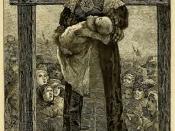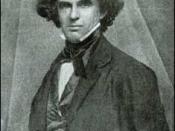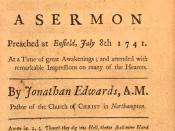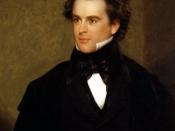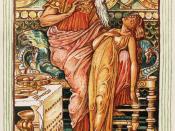"The courage of life is often a less dramatic spectacle then the courage of the final moment: but its no less a magnificent mixture of triumph and tragedy. A man does what he must in spite of personal consequences, in spite of obstacles and dangers and pressure-and that is the basis of all morality" (JFK 1). Acts of courage often go unnoticed and many times it takes all of what a person has in order to do these acts. Throughout history, man has suffered pains of guilt, remorse, and shame. If one looks at it through any form of religion, sin is discovered to be the source. However, is sin the cause of all suffering or does a lack of courage in a single moment lead to the beginning of suffering? Many who have sinned suffer, just as Dimmesdale suffers in one of Hawthorne's books. However, who is to say his sin and crime is the source of his suffering? Just like many others, Dimmesdale hides his sin from the rest of society and lives a normal external life, while on the inside he is tortured and lives each day in growing pain.
In Nathaniel Hawthorne's book The Scarlet Letter, Dimmesdale goes through a course of suffering, ultimately ending in his death, which is not caused by his sin, but rather is caused and prolonged by his cowardice and resulting inability to receive forgiveness.
From the beginning of the novel, Dimmesdale proves to be lacking in courage, which results in the beginning of his suffering. Courage implies a firmness of mind and will in the face of danger and extreme difficulty. From the moment Dimmesdale is introduced into the story, he seems to be lacking that virtue. When the people of Boston force Hester up on the scaffold and ask her to identify her partner in sin, she refuses to speak his name. At this moment, before anything has happened, Dimmesdale has the chance to show his will in a time of extreme difficulty and confess his sin. Instead he tells Hester, ''If thou feelest it to be for thy soul's peace, and that thy earthly punishment will there by be made more effectual to salvation, I charge thee to speak out the name of thy fellow sinner and fellow sufferer!''(Hawthorne 73). Dimmesdale is leaving his fate in the hands of a woman who he knows will not tell. He gives up all responsibility and control of the situation, which in turn, turns into guilt. In this act of cowardice, Dimmesdale receives a guilty conscience that starts him on his path toward suffering. From the moment of his cowardice he begins to feel the pain in his heart and not from the moment of his sin. If his sin is the reason for his suffering, then he would fell much more pain at the time Hester is being persecuted. As JFK said, "â¦a man must do what he can in spite of personal consequencesâ¦" If Dimmesdale confesses in spite of the consequences that follow he would be free internally and would not suffer as greatly. Dimmesdale's first act of cowardice to speak out and confess, with Hester, starts him on the path of suffering. However his lack of courage in public prolongs his suffering throughout the entire book.
Cowardice is not only a disgraceful fear of danger but also submitting to society based on a fear of not being accepted and this form of a cowardice leads to the continuation of suffering on Dimmesdale's part. Based on Nina Baym "The chief key to Dimmesdale's character is his dependence on the good opinion of society'' (68). Dimmesdale's actions throughout the book prove Baym's analysis of Dimmesdale's character to be true. Again and again, he conceals his secret due to a fear of losing his social status and being disgraced in society. Dimmesdale is so concerned with the community and what people think that he chooses to suffer rather than come out with the truth. In this case, his cowardice prolongs his suffering much longer than his sin would have caused him to suffer. An honorable and brave thing to do would be to announce himself as Hester's partner. However, he chooses to remain silent and this proves his cowardice to society. Many are led to pity and feel sorrow for Dimmesdale due to his inner suffering and external weakening. However, it is Dimmesdale's first act of cowardice that causes his suffering to begin, and his lack of courage in front of society and his dependence on society's good opinion that allows it to continue. As a religious leader, he has plenty of opportunities to publicly confess. However, in his sermons, instead of coming out and bluntly stating his sin, hi uses symbols to place himself as a sinner. The people, of course, misunderstand him and see his sermon as an act of humility and their admiration of him rises. This, in turn, leads him to suffer greater pain. His lack of nerve in front of his congregation causes this, not the crime for which he is trying to confess.
After one sermon he thinks, "He had spoken the truth and transformed it into the veriest falsehoodâ¦Therefore, above all things, he hates himself'' (Hawthorne). He realizes what he did and so hates himself thus accelerating his pain. This, and every sermon, adds to his growing pain and torture. His cowardice in the public eye and his fear of not only losing his social position but also not receiving forgiveness is what continues his suffering, not the sin itself. Dimmesdale is afraid God will not forgive him and so he has not the courage to repent.
As a religious leader, one would expect Dimmesdale to have a close relationship with God, yet his fear of God and his own inability to forgive leads him to punish himself. Dimmesdale's position as the community's minister keeps him from extending his and his congregation's forgiveness to Hester. His cowardice does not even allow him to forgive Hester publicly. After several years pass Hester still does not receive forgiveness from Dimmesdale's congregation. "If she entered a church, trusting to share the Sabbath smile of the Universal Father, it was her mishap to find herself the text of discourse" (Hawthorne 88). This shows that because Dimmesdale, as a public leader, does not forgive Hester, his congregation can not forgive her. Dimmesdale is then led to believe that he, if he were to confess, will not be forgiven because of the congreagations attitude toward Hester. His own cowardice creates this. The sin itself is not unforgivable, but his cowardice and his position make it so. This adds to his suffering because it leads to his self-loathing, which makes him tortue himself mentally. His sin is a past event and does not lead to his suffering. If it did he would take action to be forgiven for it. Baym states, "A religious person who believed himself a sinner would surely be deeply, even obsessively, concerned with his relations toward God"(72). If Dimmesdale, a religious leader, truly believes his sin is the source of his suffering, and that he truly is a sinner, then instead of penance he would seek a better relationship with God. Dimmesdale's idea of God is that he is a vengeful God. In Edwards' speech, 'Sinners in the hands of an Angry God', he explains this view of God. "The God that holds you over the pit of hellâ¦abhors you, and is dreadfully provoked: His wrath toward you burns like fire; he looks upon you as worthy of nothing else but to be cast into the fireâ¦" (81). This shows God as one who looks for mans flaws and sins, in order to throw them into hell. Dimmesdale's belief in this God causes him to be afraid to confess, especially to God. He fears God will not forgive him, and so he does not allow God the chance to forgive or punish him, which leads him to seek other forms of punishment. Dimmesdale begins to resort to the Old Catholic way of penance to ease his guilty conscience. "In Mr. Dimmesdale's secret closet, under lock and key, there was a bloody scourge. Oftentimes, this Protestant and Puritan divine had plied it on his own shouldersâ¦" (Hawthorne 141). By not allowing God to either punish or forgive him, Dimmesdale takes it upon himself to punish. He hurt himself through beatings and begins fasting and taking vigils for long periods of time. This leads to the deterioration of his physical and mental health. Nothing is responsible for Dimmesdales state of health except his own actions. He never has the courage to receive or ask for God's forgiveness, so his punishment and suffering continue. Dimmesdale's cowardice leads him to fear God rather than trust him. Even in his dying scene he talks of his fear of God. "I fear! I fear! It may be, that, when we forgot our Godâ¦it was thenceforth vain to hope that we could meet here after."(Hawthorne 239). His final words in life illustrate him as someone who fears that God is unforgiving and fears that he [Dimmesdale] is punished to a life, hereafter, of unhappiness. In his dying moment Dimmesdale still cannot ask for forgiveness. Fogle stated, "Even in the carefully staged scene of Dimmesdale's death, where every impulse of both the author and reader demands complete forgiveness, Hawthorne refuses to grant it" (135). This is so, because Dimmesdale never asks for forgiveness and so he cannot be granted it. Having the courage to forgive takes just as much strength as to ask for forgiveness. Dimmesdale can be seen lacking in both cases.
Through the course of Hawthorne's book, The Scarlet Letter, he shows Dimmesdale go through a course of tremendous suffering and unlivable agony, which eventually leads to his death. Many can argue, especially those who follow the orthodox reading that he suffers because he broke heavenly law and commits sin. However, it is not caused by his sin but rather is caused and prolonged by his cowardice and resulting inability to receive forgiveness. He begins to suffer the moment he does not confess, as Hester has. After his first act of cowardice, his lack of courage and inability to confess to society, continues and even worsens his suffering. Above everything else, however, it is his failure to give, ask, and receive forgiveness that ultimately causes him to suffer. In every single moment, in which Dimmesdale is given the opportunity to confess and does not, leads him to be given the name, a coward.
Work Cited Baym, Nina. "Who? The Characters." The Scarlet Letter: A Reading. Boston: Twayne Publishers, 1986. 68, 72.
Fogle, Richard Harter. "The Scarlet Letter." Hawthornes Fiction: The Light and the Dark. Norman: university of oklahoma Press, 1964. 135 Hawthorne, Nathaniel. The Scarlet Letter. Four classic American Novels. New York: Signet, 1969.
Quoteland.com- courage.
